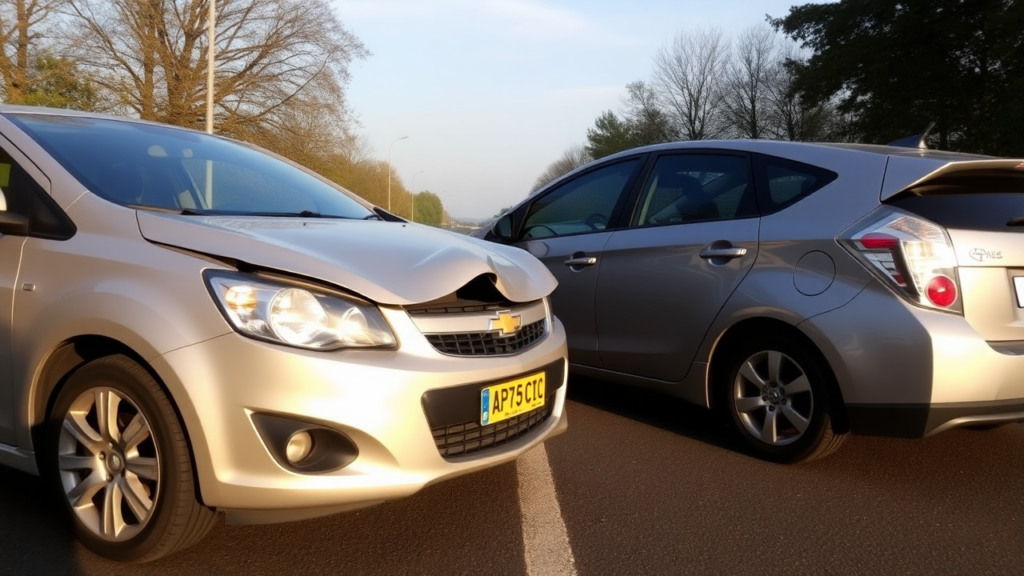Car accidents are a significant concern in Oakland due to heavy traffic and poor road conditions. If you’ve suffered a serious injury or lost a loved one in an Oakland car accident, GJEL Accident Attorneys provides experienced legal representation.
Our dedicated attorneys understand the complexities of these cases and are committed to helping you recover the compensation you deserve. Contact us today for a free, no-obligation case review.

Car accidents are an unfortunate reality on the roads of Oakland, CA. While some accidents are unavoidable, many are caused by factors that could have been prevented.
As a personal injury attorney at GJEL Accident Attorneys, I have seen firsthand the devastation that can result from a car accident.
If you or someone you love has been injured, contact our Oakland Personal Injury Attorneys today at 510-839-0707 for a free case review. We are available 24/7 and are here to help answer your questions and help you get better.
High Traffic Volume
One reason car accidents are so common in Oakland, CA, is the high volume of traffic on the roads. With over 420,000 residents and a growing population, cars on the road continue to increase.
In addition, Oakland is a popular destination for tourists and commuters, adding to the congestion on the roads. The more cars there are on the road, the greater the likelihood of an accident.
Poor Road Conditions
Another factor contributing to car accidents in Oakland, CA, is poor road conditions. Potholes, uneven pavement, and construction zones can all lead to accidents. In addition, many of the roads in Oakland are narrow and winding, making them difficult to navigate. It’s easy to see why accidents occur when combined with high speeds and heavy traffic.
Distracted Driving
Distracted driving is a major cause of car accidents in Oakland, CA. With the prevalence of smartphones and other electronic devices, it’s all too easy for drivers to take their eyes off the road. Texting, emailing, or even changing the music on a phone can all distract a driver and increase the risk of an accident. It’s important for drivers to keep their attention focused on the road at all times.
Aggressive Driving
Aggressive driving is another common cause of car accidents in Oakland, CA. Drivers in a hurry, frustrated, or angry may engage in dangerous behaviors such as speeding, tailgating, or weaving in and out of traffic. These actions can put other drivers, pedestrians, and bicyclists at risk.
Driving Under the Influence
Driving under the influence of drugs or alcohol is a serious offense that can lead to car accidents. In Oakland, CA, there have been numerous cases of drivers who were under the influence causing accidents that resulted in injuries or fatalities. It’s important for drivers to never get behind the wheel if they are impaired in any way.
Poor Visibility
Poor visibility is another contributing factor to car accidents in Oakland, CA. Fog, rain, and other weather conditions can make it difficult for drivers to see the road ahead. In addition, the lack of streetlights in some areas of Oakland can make it hard to see at night. Drivers should always be aware of their surroundings and adjust their driving accordingly when visibility is reduced.
Weather Conditions
Weather conditions can also contribute to car accidents in Oakland, CA. Heavy rain, fog, and even wind can all impact driving conditions. Drivers should adjust their speed and driving style to match the weather conditions and be aware of the increased risk of accidents.
Pedestrian and Bicyclist Accidents
Pedestrian and bicyclist accidents are unfortunately common in Oakland, CA. With a high population density and many people walking or biking to work or school, it’s easy for accidents to occur.
In addition, some drivers may not be used to sharing the road with pedestrians and bicyclists, leading to accidents. Drivers should always be aware of their surroundings and watch for pedestrians and bicyclists.
Rideshare Services
The rise of rideshare services like Uber and Lyft has also increased car accidents in Oakland, CA. Drivers for these services may be unfamiliar with the area, leading to mistakes and accidents.
In addition, some rideshare drivers may be fatigued from driving long hours, leading to poor decision-making on the road. Riders should be aware of the risks of using these services, and drivers should be cautious when using them.
Importance of Legal Representation
If you have been injured in a car accident in Oakland, CA, it’s important to seek legal representation. A personal injury attorney can help you understand your rights and the options available to you.
They can also help you negotiate with insurance companies and other parties involved in the accident. With an attorney’s help, you may recover compensation for your medical bills, lost wages, and other damages.
GJEL Accident Attorneys’ Experience in Oakland, CA
At GJEL Accident Attorneys, we have extensive experience handling car accident cases in Oakland, CA. We have helped clients recover millions of dollars in compensation for their injuries and other damages.
Our attorneys are available 24/7 to answer your questions and provide you with the guidance and support you need during this difficult time. If you or someone you love has been injured in a car accident in Oakland, CA, contact us today at 510-839-0707 for a free case review.
Call to Action
If you or someone you love has been injured in a car accident in Oakland, CA, don’t wait to seek legal representation. Contact GJEL Accident Attorneys today for a free case review. You can visit our office at 11 Embarcadero West #133, Oakland, CA 94607, or call us at 510-839-0707.
We have recently handled many cases in Oakland, CA, neighborhoods such as Jack London Square, Rockridge, and Montclair, and we are here to help you get the compensation you deserve.
Frequently Asked Questions
How much does it cost to hire an attorney at GJEL Accident Attorneys?
We work on a contingency fee basis, meaning we only get paid if you recover compensation for your injuries. There are no upfront costs or fees; our fee is a percentage of your settlement or verdict.
How long does it take to resolve a car accident case?
The timeline for resolving a car accident case can vary depending on the circumstances. Some cases can be settled quickly, while others may take months or years to resolve. We will work to resolve your case as quickly as possible.
Oakland’s roads present a challenging environment for drivers, with a confluence of factors contributing to a high incidence of car accidents. From heavy traffic and poor road conditions to the dangers of distracted and aggressive driving, the potential for collisions remains a persistent threat. The rise of rideshare services and the vulnerability of pedestrians and bicyclists further compound these risks, highlighting the city’s complex nature of traffic safety.
For those who find themselves injured in the aftermath of a car accident in Oakland, seeking experienced legal representation is not just advisable—it’s crucial.
Navigating the complexities of insurance claims, determining liability, and pursuing fair compensation can be overwhelming, especially while recovering from injuries. A dedicated attorney can provide invaluable guidance, ensuring that victims’ rights are protected and receive the support needed to rebuild their lives.
GJEL Accident Attorneys stands ready to assist those affected by car accidents in Oakland. With a proven track record of securing substantial compensation for their clients, their commitment to providing 24/7 support and personalized attention underscores their dedication to client well-being. If you or a loved one has been injured, reaching out for a free case review can be the first step towards obtaining the justice and financial recovery you deserve.
No links found.





